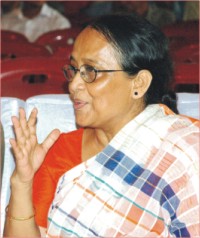|
Eid Special
Eid, the Moon, Flowers
 Prominent writer Selina Hossain was excited about Insight's offer to do a piece in English. She comments that if more Bangladeshi authors were translated into English, then a greater bridge would be created between Bangladesh and the rest of the literary world Prominent writer Selina Hossain was excited about Insight's offer to do a piece in English. She comments that if more Bangladeshi authors were translated into English, then a greater bridge would be created between Bangladesh and the rest of the literary world
My childhood and adolescence passed in Bogra on the banks of the Korotoa River, due to my father's job posting. Although it was a small village, I still think it was a place of unusual natural beauty. The wonderful childhood I spent in that tiny little village is something that I will never forget.
The village was a place of communal harmony. On one side of our house there was an Eidgah, while on the other side on the road that went towards the river, there was the wonderful big house, the Goshaibari. On the morning of Eid day we would put on new clothes and walk towards the Eidgah with other kids and adults. The boys would stand in the namaz along with the grown-ups and we girls would stand outside in the field. We used to think that was just the way it was. Today I would not accept that. Changes have come too. Girls can also go inside a mosque a pray. In our children, having fun was the main thing about Eid. After returning from the Eidgah we would run to the Goshaibari to pick flowers. There were two large bokul trees. It was as though the scent of the flowers were celebrating the joy of Eid. I am surprised to find how vivid this memory is for me.
In childhood I had learnt to equate the beautiful scent of the flowers with the happiness of Eid. I never asked why. That the two would be fused together seemed so natural. There were no restrictions for us to run off to the Mukund Goshai Ashram. Nobody would say: it is Eid, why do you need to pick flowers today? This freedom we got early on affected us very deeply. We understood that we all wanted our own occasions to celebrate, to have fun. Everybody was entitled to celebrating their own religious festivities.
I still remember that on Eid day, a Hindu friend of mine used to talk my father into giving her a new outfit for Eid. After all, how else could she join in the fun with us on that day? Eid was an occasion for her too! During the Puja, I too would run towards the sound of the drums to check out the action. That was an occasion for me.
When I was a young, I used to think of the fasting in Ramadan as an aspect of Eid. Of course, my parents had taught me about religion and the holy duty of fasting. Attending Sehri and Iftar with everyone was a fun thing to do. I had grown up with this belief, but I had also learnt to judge good and bad out of these beliefs. My parents had taught me the difference between right and wrong through examples derived from Ramadan and Eid. These days when I see prices rise during Ramadan, I realize that these people have not learnt the lessons of Ramadan in their childhood. They wouldn't behave this way if they did.
I remember a girl from a poor family called Minu used to play with us. Once she didn't get a new outfit for Eid, and she cried so much! I still remember how embarrassed I was to be wearing new clothes. I wanted all my friends to chip in and buy something for her. We played together all year, but we forgot about her on Eid? From the values I had learnt from my parents, I knew this was unjust. That day, through a lot of effort, I got her to come to our house and have some shemai. The injustice I sensed bothered me so much that I have not been able to forget it to this day.
The most fun part of all this was on the last day of Ramadan, looking out at the sky, waiting to spot the moon, the signaler of Eid. Those were evenings of tremendous excitement. We friends would even have a little 'competition' as to who could spot the moon first. Now I wonder why we no longer have such great expressions of love centered around the moon. This excitement of childhood isn't there much any more among today's city kids. In the villages, children still relish seeing the moon.
I still associate Eid with the smell of flowers, it is a religious as well as a human celebration. Eid means a slice of moon in sky. One day this slice grows to be a full moon, brightening the night. My dreams for a better Bangladesh is mixed up with my childhood memories of Eid.
Copyright
(R) thedailystar.net 2007 |
